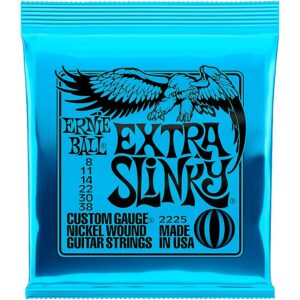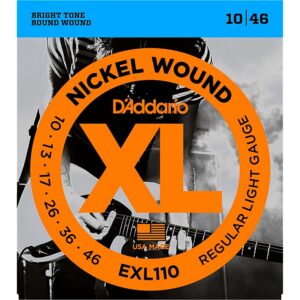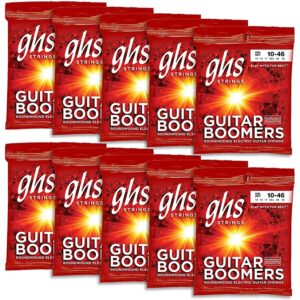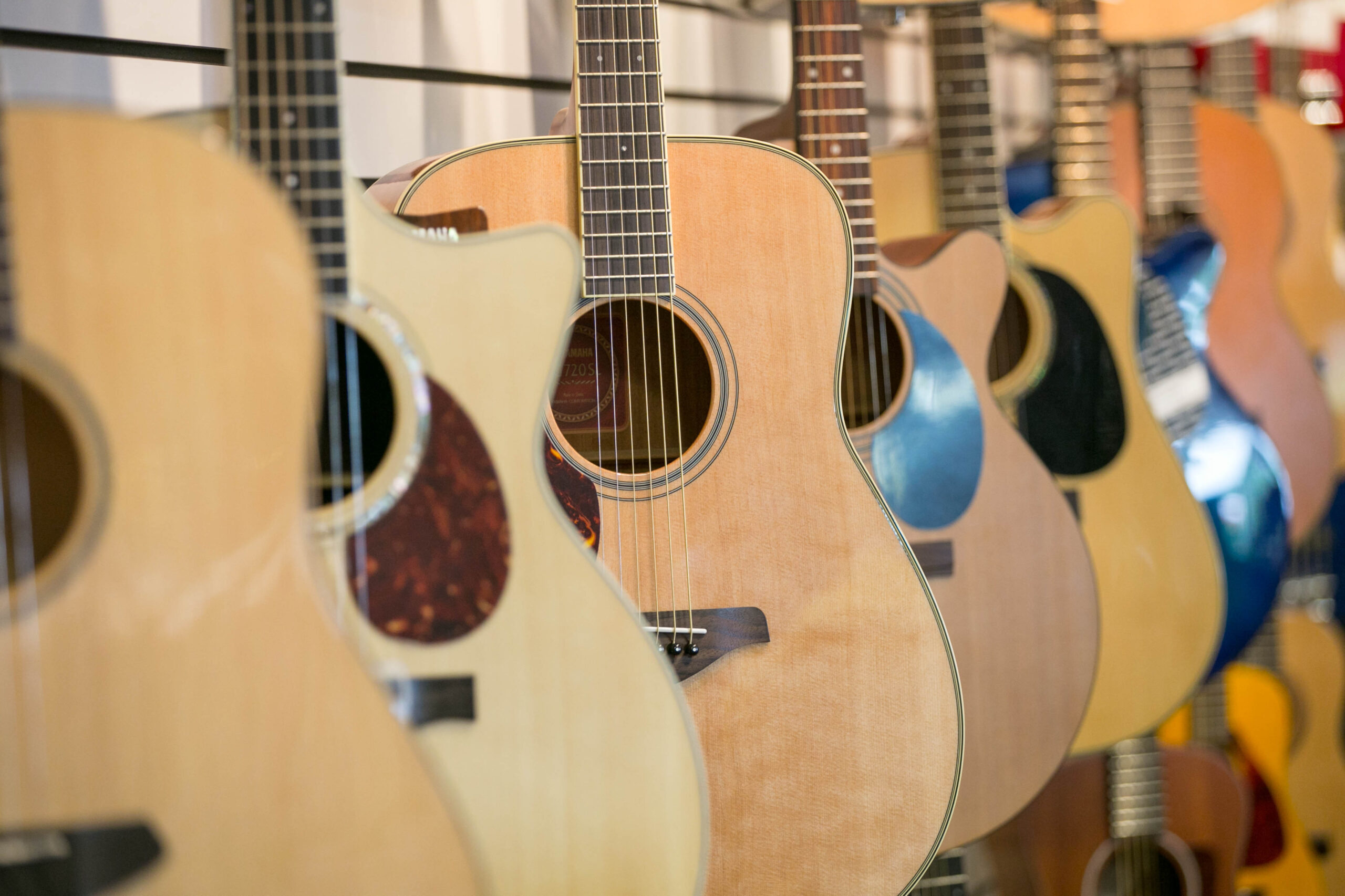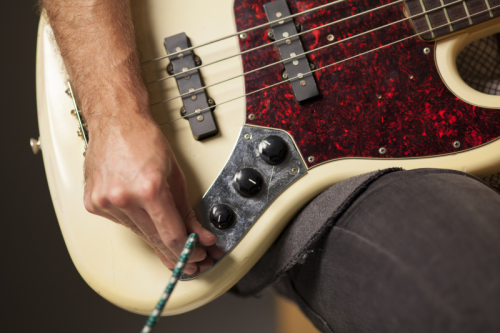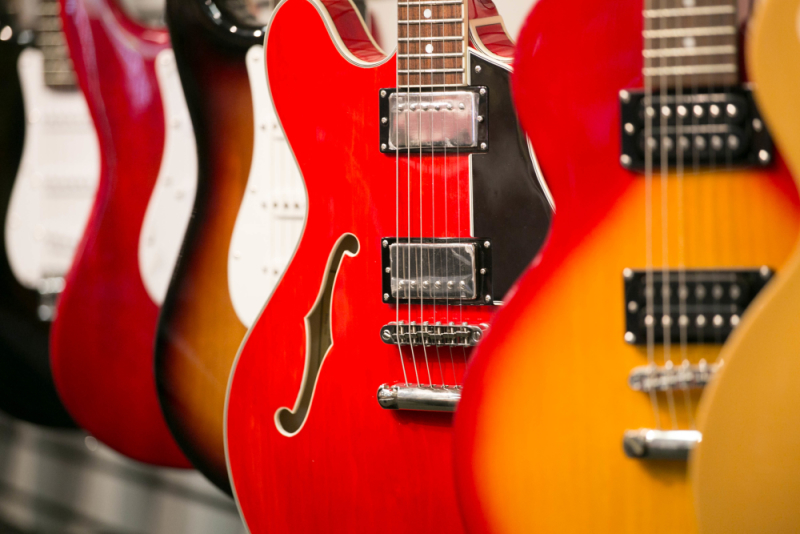April 09, 2015
How to Choose Electric Guitar Strings
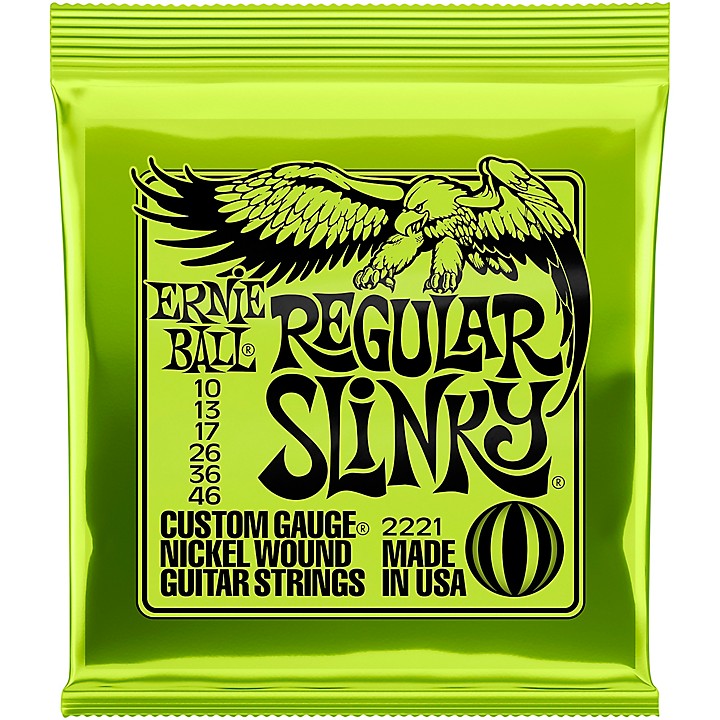

Since the electric guitar produces sound by amplifying the strings’ vibrations across a metal plate, the type of electric guitar string used heavily influences the sound quality and overall tone of the instrument. While selecting the proper electric guitar string may seem like a daunting task, understanding each of the factors that affect guitar sound and taking the time to research and experiment can help take some of the guesswork out of the process. Read on for advice on how to find the electric guitar strings that best match your electric guitar and playing style.
String Gauges
Electric guitar strings are manufactured in a variety of thicknesses, or gauges. Designated in thousandths of an inch, the lightest gauges are typically an .008 and the heaviest a .56. Although each string technically has a different gauge, as thinner strings produce higher notes and vice versa, the gauge is identified by the diameter of the thinnest string in the set. For example, if the thinnest string has a diameter of .008 the guitar is said to be strung with “8s”. When it comes to electric guitar strings there are six basic gauges: extra light, light, standard, medium, medium heavy, and heavy. Thinner string sets are easier to press down, and tend to be favored by beginners who have yet to build strength in their fingers. Although lighter strings tend to break more easily and produce less volume, they exert less tension on the guitar neck.
Ernie Ball Extra Slinky Electric Strings are widely revered for their world-class tone. The wound strings are made from nickel-plated, steel wire wrapped around a hex-shaped steel core wire. The plain strings are made of specially tempered, tin-plated, high-carbon steel, producing a well-balanced tone for your guitar. Learn More.
The key to finding the right electric guitar string gauge is experimentation. Since the differences between the string types are subtle, focusing on the differences between touch and tone can help you find the right string gauge. Try different gauges, brands, and string compositions to find those that feel and sound the best.
String Materials
When it comes to string materials, there are three types of strings commonly used on electric guitars: nickel-plated, stainless steel, and pure nickel. Although all three have a basic steel base, each is wound in a different fiber to create a unique sound. Nickel-plated steel are the most common string type for electric guitars- they’re resistant to corrosion, last longer than untreated stainless steel strings, reduce finger noise during play, and reduce fret wear. Some electric guitar players find that the coating produces a more mellow sound than the alternatives. Better suited for true rock, stainless steel strings produce a brighter, louder sound. Unfortunately, the purity of their tone production is short lived, and stainless steel strings tend to produce a high level of noise along the finger and fret. Finally, pure nickel strings are best suited for use in the jazz and blues genres, as they’re softer than other string options and have a smooth, warm tone.
World-renowned as “The Player’s Choice” among guitarists of all genres and styles. EXL strings are wound with nickel-plated steel, known for it’s distinctive bright tone and reduced fret wear. EXL110s are among D’Addario’s most popular round-wound, nickel-plated electric guitar strings. Learn More.
Type of Winding
High E, B, and sometimes G strings are unwound. The other strings have steel or nickel wrapped around them, referred to as “winding”. As with gauge and material, the type of winding affects both the tone and the playability of the instrument. There are three common windings: roundwound, flatwound, and halfwound. Roundwound is the most popular winding method; strings that are roundwound have a noticeable ridged texture and produce more ‘bite’. Along with this bite, they also tend to produce more finger noise and fretboard wear. Halfwound, sometimes referred to as groundwound, produces a darker tone with less attack. They’re the hardest to find, so guitarists who prefer halfwound winding can expect to pay a premium for these strings. Finally, flatwound is very smooth to the touch and is a popular choice among jazz and blues guitarists.
GBL Boomers feature roundwound nickel-plated steel strings for passion, power and performance. Their bright, long-lasting tone makes Boomers guitar strings the standard to play by. These GHS electric guitar strings are designed for heavy metal, rock, country, blues, and pop styles. Learn More.
As with string gauges and materials, there is no winding type that’s ‘better’ than the others. At the end of the day, it’s a matter of personal preference. In order to ensure that you’re making the right choice, experiment with different winding types until you find the type that’s right for you and your playing style.
Shopping for Electric Guitar Strings
When shopping for electric guitar strings, it’s important to have a budget and playing style in mind. If this is the first time you’re purchasing strings, experiment with the different variations and find the type that works for you. Whether you’re shopping online or in a store, a good way to narrow your options is to select a material and gauge size first and move forward from there. From there, consider brand, winding, and price point. In regards to price, electric guitar strings don’t have to be super expensive to produce a great sound. Instead of automatically reaching for the most expensive strings, spend some time researching, reading reviews, or talking to other electric guitar players.
Other Tips
It may be time for a string change if:
- getting in tune and staying in tune are more challenging than usual,
- your tone sounds especially flat,
- you’re noticing rust, discoloration, or unwinding of your strings,
- you can’t remember the last time you changed your strings,
- string wraps are unwinding exposing the core.
With electric guitar strings, some individuals may need to replace their strings more often than others. Here’s some factors that can shorten the life of your strings:
- you sweat a lot while playing,
- you play aggressively with a lot of hard picking,
- you play frequently and/or change tunings frequently,
- you smoke or play in smoky environments, such as bars or clubs.
If you’re new to the world of acoustic guitar strings, here are some general string care and maintenance tips:
- keep a clean cloth handy and wipe down your strings after each use,
- wash your hands before playing- it’ll help prevent oxidation,
- invest in a string winder,
- note the date you changed strings on the package,
- buying single strings in bulk can be a smart, budget-friendly move, especially for players who use light gauge strings,
- keep an extra set or a few single strings handy in case of an emergency.
In the market for an electric guitar? Check out our Electric Guitar Buying Guide.




